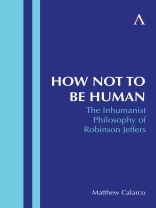Current debates in the environmental humanities, animal studies, and related fields increasingly revolve around this question: What to do with “the human”? Is the human a category worth preserving? Should it be replaced with the post-human? Should marginalized and minoritarian groups advocate for a universal humanism? What is the relationship between humanism and anthropocentrism? Is a genuinely non-anthropocentric mode of thinking and living possible for human beings? This book argues that the writings of twentieth-century poet Robinson Jeffers offer twenty-first-century readers a number of crucial insights concerning such questions and timely advice about how not to be human. For Jeffers, our tendency to turn inward on ourselves and to indulge in human narcissism is at the heart of the social, economic, and existential ills that plague modern societies. As a remedy, Jeffers recommends turning ourselves outward—beyond the self and beyond the human—and learning to affirm and even love the inhuman cosmos in all of its terrible beauty. In the process, Jeffers helps us find our way back to ourselves, but this time no longer as “human” in the traditional sense but as plain members of the inhuman world.
Inhaltsverzeichnis
Preface; Abbreviations of Works by Robinson Jeffers; Introduction: Between Poetry and Philosophy; 1. Evil; 2. Saviors; 3. Cosmos; 4. Human; 5. Value; Conclusion: Inhumanism; Suggestions for Further Reading; Index
Über den Autor
Matthew Calarco is Professor of Philosophy at California State University, Fullerton.












